Mangools Review 2024: The Best SEO Tool For Beginners?

Welcome to our Mangools review.
Mangools is one of our top-recommended SEO platforms on account of its ease of use and affordable price point.
In this review, we’ll be telling you everything you need to know about Mangools before you buy.
First, we’ll explain what it is and try out all of the tools it comes with so you can see how everything works.
Then, we’ll give you our verdict on what we think Mangools biggest pros and cons are. Plus, we’ll also explain the different pricing options available, highlight some alternative platforms, and more.
What is Mangools?
Mangools is an online platform that gives you access to a bunch of useful SEO tools.

You can use its toolkit to find high-volume, low-competition keywords, analyze the SERPs for any location, track your search engine rankings, prospect for backlinks, conduct competitor research, and more.
Basically, all the stuff that bloggers, content marketers, and SEO professionals do on a monthly basis.
What makes Mangools different from other SEO platforms that offer the same sort of thing is how easy it is to use.
It’s designed to be as beginner-friendly as possible and has one of the simplest user interfaces we’ve seen.
Plus, it offers a generous free plan, as well as scalable paid plans with different usage allowances so that you only pay for what you use.
What features does Mangools offer?
Mangools is a made up of five different tools:
- KWFinder (keyword research)
- SERPChecker (SERP analysis)
- SERPWatcher – (keyword rankings)
- LinkMiner – (backlink analysis)
- SiteProfiler – (SEO metrics & insights)
When you first log into your dashboard, you’ll see all of these tools side by side. Click on any of them to get started.
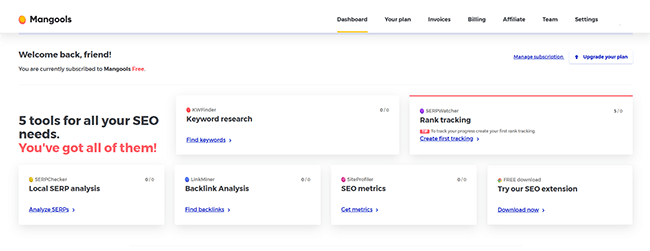
Below, we’ll walk you through how each tool works, as well as a few other features worth mentioning. Let’s start with KWFinder.
KWFinder (keyword research)
KWFinder is Mangools’ keyword research tool. You can use it to discover thousands of juicy new keyword ideas and analyze them.
First, open the app. Then, decide whether you want to Search by Keyword or Search by Domain.
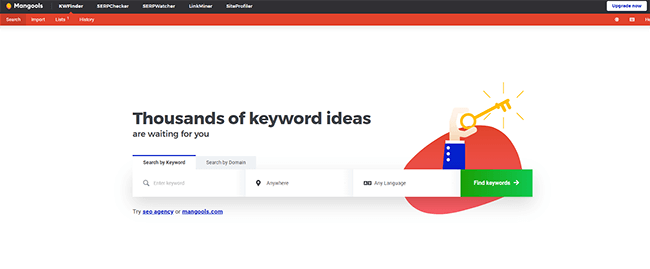
With the former, you enter a seed keyword, and Mangools pulls up a list of related/similar keywords.
With the latter, you enter a competitor’s website URL (or your own website), and Mangools will use that to generate keyword ideas based on what that domain is already ranking for.
For now, we’ll enter a seed keyword. Notice you have the option to set a target location and language.
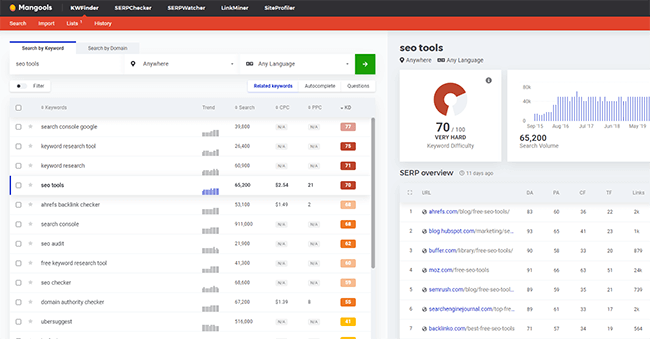
Once you’ve hit search, Mangools will generate a report with a running list of tons of related keywords, as well as suggestions from Google Autocomplete and common questions about your seed keyword.
Next to each suggestion, there are a few useful metrics. You can see the total monthly search volume, keyword difficulty, cost per click (CPC), and PPC competition (PPC).
To sort through your options, you can sort and filter the suggestions by any of the above metrics. For example, if you’re only looking for low-difficulty keywords that are easy to rank for, you might sort them by KD in ascending order.
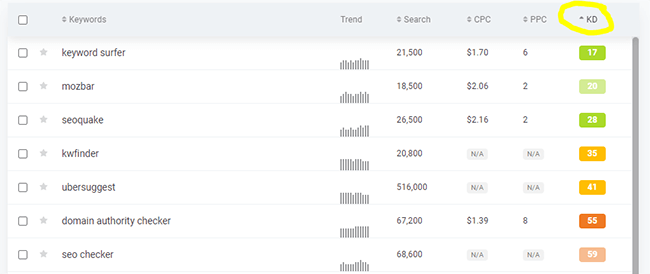
Or, if you don’t want to target any keywords with less than 1k searches/month, you can click the Filter button and add a MIN search volume of 1,000.
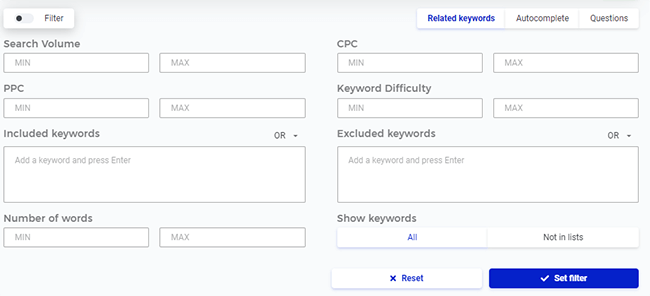
To dig deeper into a keyword, click on it, and Mangools will pull up an overview of the SERPs for that term on the right.

Here, you can see what websites are already ranking for that search query, as well as their authority metrics (like DA, PA, TF, etc.) and the number of backlinks that point to the page. This can help you to quickly assess the competition and work out whether you have a realistic chance of ranking.
Above the SERP overview, you’ll see a Trends graph with historical data. You can look at this to see how the volume of monthly searches for a given keyword has changed over time and work out whether it’s trending up or down.
Once you’ve found a keyword you want to target, you can highlight it and click Add to list to create a new keyword list. This makes it easier to track keywords you’ve targeted later. You can also export keywords as a CSV or copy them to your clipboard.
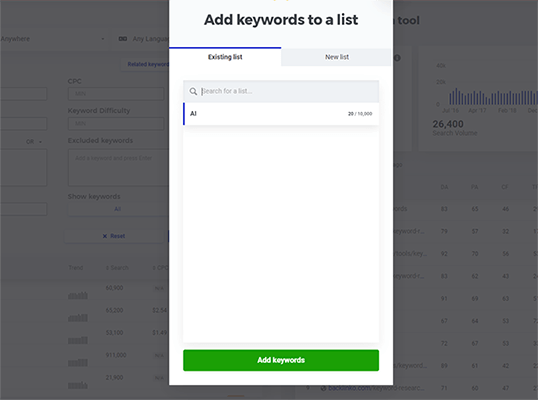
If you Search by Domain, you’ll get the same report with a couple of extra metrics next to each keyword suggestion, like average ranking position and EV.
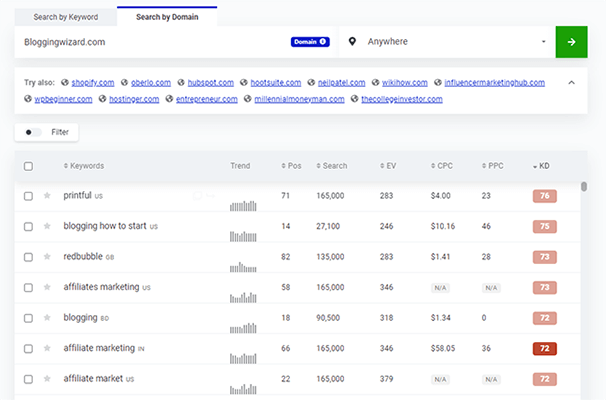
The average ranking position tells you the position that the domain you entered usually ranks on Google for in the location you set.
Searching by domain can be a good way to find easy-win opportunities. For example, you could enter your own domain and look for terms you’re ranking for, but not on page one. Then, refresh those posts/pages to move them closer to the top to get more traffic.
As keyword research tools go, Mangools KWFinder is fairly easy to use and has some additional features that can make keyword planning fast and easy. You
SERPChecker (search results analysis)
Next, let’s look at the SERPChecker app. You can use it to analyze the search engine results pages (SERPs) and assess the competition.
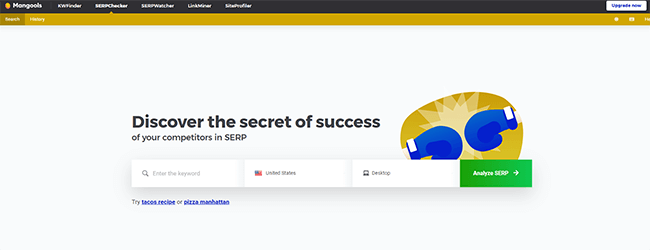
To get started, enter the keyword you’re trying to rank for and select the location you’re trying to rank in. Then, hit Analyze SERP.
You’ll then be brought to the SERP report:
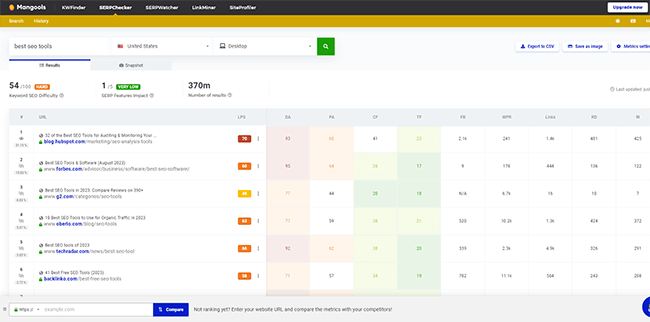
Here, you can see a list of all the 10 top-ranking pages for that keyword (you can click + Load more results to see lower-ranking pages).
Next to each result, there are boxes filled with metrics to help you to analyze the strength of the competition. And each box is color coded to let you know whether the competitor page scores high or low in that particular metric.
By default, you’ll see metrics including Link Profile Strength (LPS), Domain Authority (DA), Page Authority (PA), Citation Flow (CT), Trust Flow (TF), and a bunch more. But you can also turn metrics on/off through the Metrics settings to customize your report.
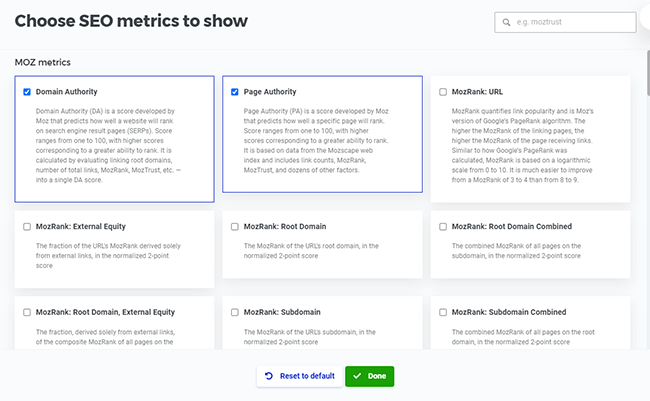
There are literally dozens of extra ones here that aren’t on by default but that you might want to see.
If you switch over to the Snapshot tab, you’ll see a live view of the SERPs for that target keyword, as if you’d just entered it as a search query on Google.
At the bottom of the SERPChecker report, you’ll see this box:

Enter your URL here, click Compare, and Mangools will load up your site in the report, so you can see how you compare to your competitors in all the key metrics and evaluate whether or not the keyword is a viable ranking opportunity.
SERPWatcher (rank tracking)
SERPWatcher is Mangools’ rank tracking app.
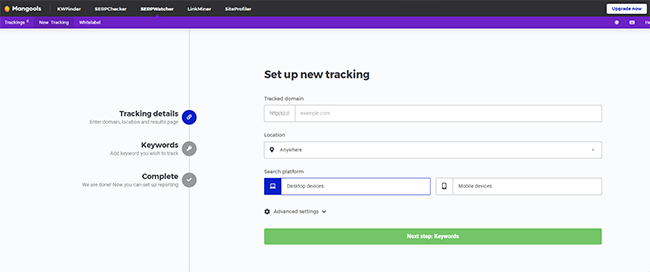
The idea is that you enter the domain you want to keep track of and the keywords you want to keep an eye on, and Mangools will let you know whenever your ranking position for that keyword changes.
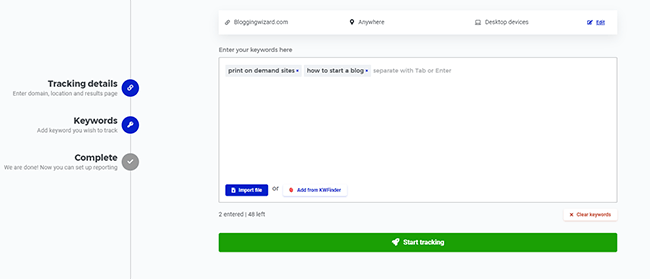
You can enter keywords manually, import them from KWFinder, or upload a file from your computer.
Once you’ve set up keyword tracking, you’ll be able to see your average ranking position in any location, on both mobile and desktop, at any given time.
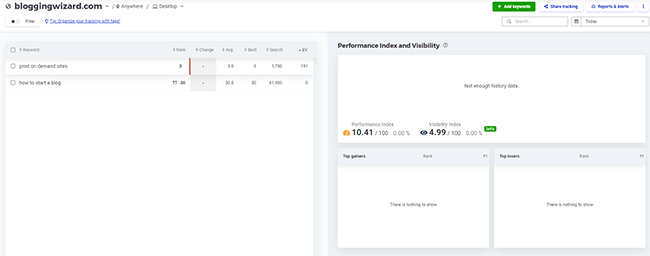
You can also pull up the ranking report to see things like your Visibility Index and Performance Index scores, the estimated number of website visits you’re getting from tracked keywords, your top gainers and losers, keyword position flow, keyword distribution, and more.
LinkMiner (backlink analysis)
LinkMiner is one of my favorite Mangools tools. It makes it easy to find backlink opportunities, manage your link profile, and improve your off-site SEO.
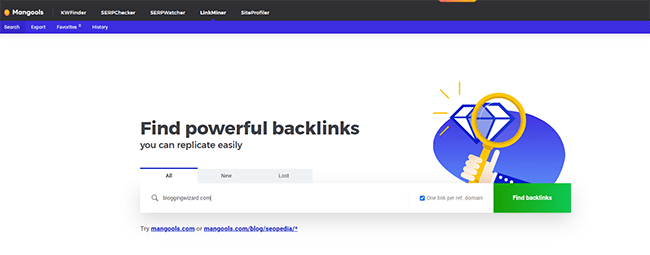
To get started, open up the app, and enter any domain you want to see the backlink profile of.
If you’re looking for new link-building opportunities, I’d recommend starting with one of your competitor’s URLs.
Then, click Find backlinks.
In the report that Mangools generates, you’ll see a list of all the pages that are linking to the analyzed domain.
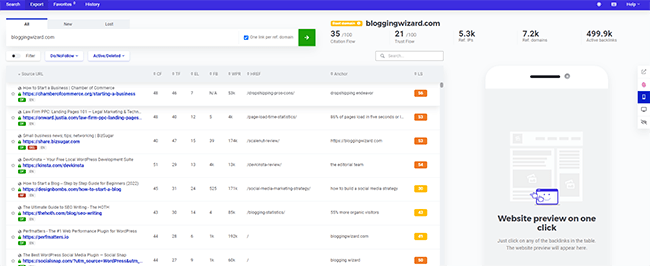
Next to each page, you’ll see metrics that you can use to analyze how powerful the link is, like Link Strength (LS) and Trust Flow (TF).
You can also see whether the link is DoFollow or NoFollow, the anchor text used, the specific page on the domain that the link points to, and all the other stuff you need to know.
And you can even click on any backlink to open up a preview of the page it appears on if you want to see it in context.
To find the best link opportunities, you can filter the results. For example, you can filter it to show only DoFollow links if you’re only interested in backlinks that pass link juice/equity.
The New and Lost tabs help you to keep tabs on your own link profile by showing you all the backlinks you’ve accrued or lost recently.
SiteProfiler (SEO metrics & insights)
SiteProfiler is basically a domain checker tool.
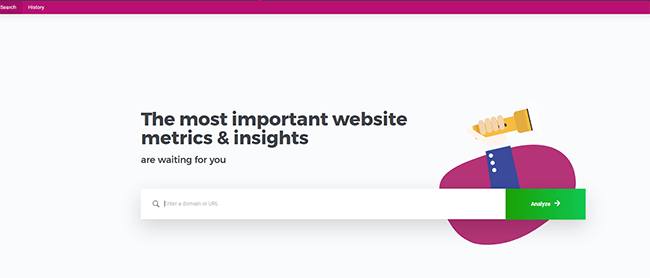
You enter the URL you want to analyze, and Mangools generates a report with everything you need to know to measure SEO strength/performance.
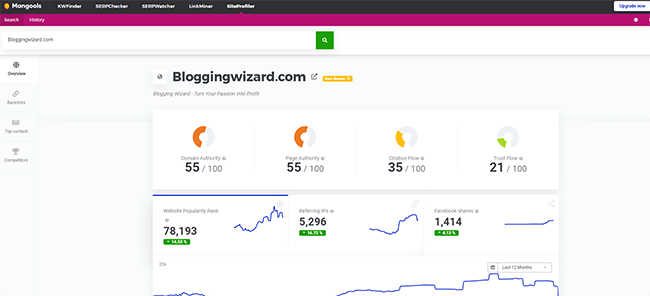
At the top of the page, you’ll see authority metrics like Domain Authority, Page Authority, Citation Flow, and Trust Flow.
Below that, you’ll see graphs that visualize how your website’s popularity rank, number of referring IPs, and Facebook shares have changed over time.
Further down, you can see backlink profile data, like the domain’s total number of backlinks, DoFollow/Nofollow link ratio, active/inactive links ratio, anchor text distribution, top referring domains, etc.
Further down still, you’ll be able to see the domain’s top content by both referring domains and Facebook shares, as well as its top competitors.
Other features
Aside from the tools we’ve looked at so far, there are a couple of other features that you get with Mangools worth knowing about:
- SEO Extension. You can install Mangools as an extension on both Chrome and Firefox to use its tools on the go directly from your browser. This makes it really easy to optimize your content whether you’re using Google Docs, WordPress or another content editor
- SERP Volatility Checker. Google’s algorithm is changing all the time, and some updates bring big changes that can affect your ranking position. Mangools free SERP volatility checker keeps track of average ranking positions across millions of tracked keywords to give SEOs a heads up when something big is occurring.
- SERP simulator. This is another free tool that anyone can use. You enter your URL, title, description, and SERP features, and Mangools will show you a preview of what the page will look like in the Google search results. This can be really useful if you’re keen to make your titles and snippets as clickable as possible.
How much does Mangools cost?
Mangools offers five pricing plans for you to choose from: Free, Entry, Basic, Premium, and Agency.
No matter which plan you choose, you’ll have access to all the same features—the difference is in usage limits/allowances. We’ve outlined the credits/allowances that you get with each plan below (note that for most features, allowances typically reset every 24 hours)
The Free plan won’t cost you anything, but you can only use the tools a very limited number of times a day, so it’s only really useful for testing it out before you buy. It includes:
- 5 keyword lookups
- 15 keyword suggestions
- 5 SERP lookups
- 5 keyword rank tracks
- 1 tracked domain
- 1000 backlink rows
- 2 site lookups
Mangools Entry costs $29/month (or $19.90 per month when you pay annually) and has modest usage allowances. It’s a good choice for independent bloggers and content marketers who are only working on one website (rather than with multiple client sites). It includes:
- 25 keyword lookups
- 50 keyword suggestions
- 25 SERP lookups
- 50 keyword rank tracks
- 1 tracked domain
- 25,000 backlink rows
- 10 site lookups
Mangools Basic costs $49 per month (or $29.90 per month when you pay annually) and comes with a decent number of credits for all the apps. It includes:
- 100 keyword lookups
- 200 keyword suggestions
- 100 SERP lookups
- 200 keyword rank tracks
- unlimited tracked domains
- 100,000 backlink rows
- 20 site lookups
Mangools Premium costs $69 per month (or $44.90 per month when you pay annually) and comes with even higher limits that should be more than sufficient for most users. It includes:
- 500 keyword lookups
- Unlimited keyword suggestions
- 500 SERP lookups
- 700 keyword rank tracks
- 500k backlink rows
- 70 site lookups
Mangools Agency costs $129 per month (or $89.90 per month when you pay annually). It’s the top-tier plan and a better choice for teams and marketing agencies that work with multiple clients and need to operate at scale. It includes:
- 1,200 keyword lookups
- Unlimited keyword suggestions
- 1,200 SERP lookups
- 1,500 keyword rank tracks
- Unlimited tracked domains
- 1.2 million backlink rows
- 150 site lookups
There’s no free trial (just the free plan), but Mangools offers a 48-hour money-back guarantee, so you can try out the paid plans risk-free.
Mangools pros and cons
Now that we’ve had a chance to explore all of Mangools features, and looked at its pricing options, here’s what we think the biggest pros and cons are.
Mangools pros
- Easy to use. By far, the best thing about Mangools is how easy it is to use. Most of the apps work the same way: You open it up, enter a domain/keyword, click search, and read the report. That’s all there is to it. You don’t need any technical skills to get started, so it’s perfect for beginners who want to keep things simple. If you’re completely new to SEO and you’re not sure where to start, Mangools makes it really easy to learn the ropes.
- Five-in-one toolkit. Unlike some other SEO tools, Mangools doesn’t just focus on one area, like keyword research. It offers five different apps to help with all the most important parts of SEO, including rank tracking, backlink analysis, domain analysis, SERP analysis, and keyword discovery.
- Straightforward and affordable pricing. Mangool doesn’t gate any of its features behind expensive plans. No matter which plan you sign up for, you get access to all of the same tools. The only difference is in usage allowances, which makes it super scalable. And it’s good value for money too.
- Lots of metrics. Mangools can show you dozens of metrics to help you analyze SEO opportunities and your competitors. And you can customize some of the reports to decide what data you want to surface. This can be helpful if you’re working with clients that are tracking different metrics or trying to reach a range of SEO goals.
Mangools cons
- No site audit tool. Unlike other tools, Mangools doesn’t give you any tools to audit your site and check for technical SEO issues like broken links, crawlability/indexing issues, dodgy redirects, etc.
- Dependent on third-party data sources. Mangools doesn’t have its own proprietary metrics. Instead, it relies heavily on third-party providers Moz and Majestic for things like search volumes, keyword difficulty, and backlink data.
Mangools alternatives
- SE Ranking | Our review – SE Ranking is another all-in-one platform that comes with everything SEOs and content marketers need. It can do most of the same stuff Mangools can, but it also comes with a few additional features that you don’t get on Mangools, like site auditing, a content editor, and an AI writer.
- Semrush | Our review – Semrush is one of the most popular SEO solutions on the market. It has the broadest feature set, the largest database, and some best-in-class tools you won’t find anywhere else. However, it’s much more expensive than Mangools.
- Serpstat – Serpstat is advertised as a ‘growth hacking tool for SEO, PPC, and Content marketing. Features include keyword research, keyword clustering, competitor analysis, AI content generation, and site auditing.
Final thoughts on Mangools
That concludes our Mangools SEO review. Here’s our final verdict.
Overall, Mangools is an excellent choice for beginners who are looking for an all-in-one SEO solution.
It gives you everything you need to conduct keyword and competitor research, find backlinks, and track your rankings. And it’s available for a fraction of the cost of some of its competitors.
Plus, it’s really easy to use – the UI couldn’t be simpler.
However, it’s missing a few features that you can get with other AIO SEO software, like site auditing, on-page SEO analysis, writing/editing tools, etc.
If that isn’t a dealbreaker for you, we’d definitely recommend signing up for the free plan and trying it out for yourself. Just click the button below to get started.
Disclosure: Our content is reader-supported. If you click on certain links we may make a commission.
